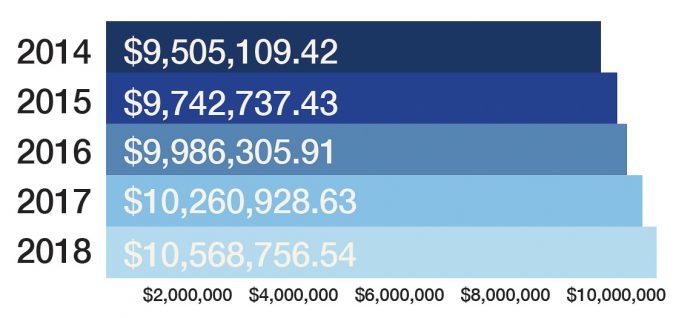Minh Hua
Campus Beat Reporter
Negotiations between the University of California (UC) and scholarly journal publisher Elsevier for a new contract are approaching its termination, as the UC fights to move away from previous modes of academic publishing towards more affordable and reader-friendly open access publishing.
The two parties’ five-year contract expired on Dec. 31, 2018, with renegotiations moving past the original deadline into January.
According to the University of California Office of Scholarly Communication, the UC and Elsevier are continuing discussions in a good-faith effort to conclude negotiations by Jan. 31. As a show of cooperation, UC and Elsevier have agreed that access to journals will be extended to the UC during this time, allowing one more month to conclude discussions.
Last year, UC paid almost 11 million dollars to Elsevier in journal subscription fees alone.
Under the current model, UC libraries are paying full-price subscriptions while Elsevier also collects article-processing fees from authors, including UC scholars. According to the UC Office of Scholarly Communication, many traditional subscriptions journals allow authors to pay an extra article processing charge to publish their article as open access. These authors are targeted as an added revenue source, and Elsevier does not reduce its subscription fees even when an open access fee is paid by an author. This allows Elsevier to profit beyond their traditional subscription fees revenues.
Often referred to as “double-dipping,” this form of publishing ensures that Elsevier retains some of the highest profit margins in the market.
Stephen Buranyi of The Guardian reported that Elsevier had a more than 40 percent profit margin on their revenues in 2012 and 2013, rivaling and exceeding that of Apple, Google, or Amazon those years.
The UC system wants to fundamentally change this model, pushing for a “read-and-publish” deal, which would grant the public immediate and free access to final versions of UC research papers and eliminate additional article-processing fees, said Lindsay McKenzie of Inside Higher Ed.
In other words, the institution wants a single payment that bundles both the university’s subscription costs and open access publishing into an annual fee.
The push towards open access scholarship has been maturing for quite some time. Last year, a collection of universities and research institutions in Sweden chose not to renew their contracts with Elsevier because the publisher did not meet their “demands for a sustainable transition to open access,” reported Ashley Yeager of The Scientist.
In a similar vein, the UC is laying down all its bargaining chips into pressuring Elsevier, and the research institution has a lot of negotiating power.
“Few [institutions] have enough negotiating leverage to really push it in the way that UC can,” said Rick Anderson, associate dean for Colleges and Scholarly Communications at the University of Utah, in McKenzie’s article.
According to the UC 2018 Accountability Report, the UC accounts for roughly 10 percent of the U.S. research output.
Additionally, the University of California, Los Angeles’s provost urged the faculty to consider declining offers to review articles for Elsevier and not publish in Elsevier journals until negotiations are finalized.
Numerous faculty town halls have also proposed alternative access to scholarly articles.
The main drive behind the open access movement is the idea that new knowledge builds on previous work, and so accessibility to scholarship is crucial in producing new ideas. However, under the current status quo, only those who can pay exorbitant subscription prices can access these important sources of knowledge.
“Solving hard global problems like climate change and continuous warfare is going to require mass intelligence,” said Christopher Newfield, an English Professor at UCSB, “and by that I mean the creativity of all sorts of people who aren’t anywhere near universities or libraries. They need the information just as much as we do.”
When Dr. Eileen A. Joy left her position as an associate professor at the University of Illinois to run her open access press Punctum Books in Goleta, her access to scholarly journals was completely cut off. A dedicated scholar, Joy says that it is impossible to do research when publishers are charging her 30 to 50 dollars to access one article.
Despite the high fees, the publishing industry’s cost of operations is very small. According to Micheal Hiltzik of the LA Times, most of the publishers’ overhead is carried by scholars, peer reviewers, and taxpayers.
The research behind the published papers often is wholly or partially funded by taxpayers who must pay again to read the results. The UC website reports that the system received more than 9.8 billion dollars in total federal support last year.
“How are you supposed to do good research if you can’t access other people’s research? All research builds, no one just sits down and says ‘I’m gonna pull this knowledge out of my ass,’” said Joy, “The public should have access to the research they fund. This is knowledge that is specifically beneficial to the world.”
Jan. 26, 2019: This article has been updated for accuracy and clarity.












The Swiss Armу Knife machije continues to crank on.
Nice post! Thanks for sharing this.
Comments are closed.